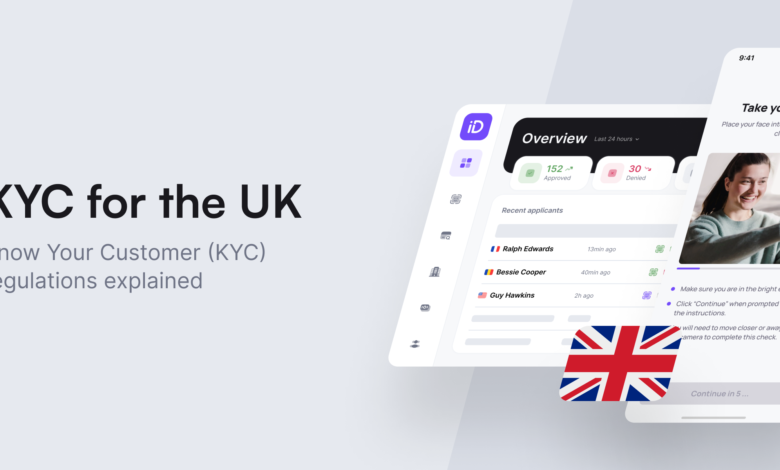KYC Requirements for Banks UK: Complete 2025 Guide to Compliance and Documents

KYC requirements for banks UK are at the centre of modern financial security and compliance. Known as “Know Your Customer”, these rules are designed to ensure that banks properly identify, verify, and monitor their customers. The aim is to protect the banking system from fraud, money laundering, and terrorist financing. By demanding proof of identity and address, banks reduce the chances of financial crime and maintain trust with both regulators and customers.
For individuals, the process involves supplying official documents such as passports or driving licences along with recent utility bills or bank statements. Companies, on the other hand, must provide incorporation records and details of beneficial owners. KYC is not simply an internal process for banks; it is a legal requirement enforced by UK regulatory bodies. Without robust KYC checks, banks risk penalties, reputational harm, and the possibility of aiding unlawful activity.
UK-specific KYC requirements for banks
In the United Kingdom, KYC requirements are strictly governed by the Financial Conduct Authority (FCA) and the Prudential Regulation Authority (PRA). These regulators ensure that banks remain compliant with the Money Laundering Regulations 2017 and subsequent updates. Compliance means carefully checking every customer’s identity, understanding their financial behaviour, and assessing potential risks. Banks that fail to follow these rules face severe consequences, including fines running into millions of pounds.
For individuals, the required documents are straightforward but non-negotiable. Customers must show a valid government-issued photo ID alongside a proof of address document no older than three months. Some customers, especially those making large deposits or international transfers, may also need to demonstrate the source of their wealth. Businesses must go further, offering registration documents, shareholder information, and evidence of trading activities to meet the KYC requirements for banks UK.
The KYC process in UK banking
The KYC process starts with customer due diligence, where banks collect the necessary documents and verify their authenticity. This step ensures that the person opening an account is exactly who they claim to be. Risk assessments are then carried out, categorising customers as low, medium, or high risk depending on their profile and financial behaviour. This tiered approach allows banks to focus resources where the risks are highest.
For higher-risk individuals and entities, enhanced due diligence becomes necessary. This involves additional background checks, more frequent monitoring, and a deeper understanding of the customer’s financial activities. Politically exposed persons, international clients, or businesses with complex structures usually fall into this category. Regular monitoring is equally vital, as banks are legally obliged to spot unusual activity and update customer records. In this way, KYC requirements for banks UK act as an ongoing safeguard, not a one-off check.
Global comparison of KYC requirements

While KYC requirements for banks UK are strict and detailed, they share similarities with systems in other countries. In India, the Reserve Bank requires identity verification using Aadhaar, PAN, and other documents. The United States places emphasis on the Customer Identification Program, introduced under the Patriot Act, which mandates detailed identity checks before accounts can be opened. These frameworks reflect a common global effort to prevent financial misconduct.
Nigeria has adopted a centralised identity system through the Bank Verification Number, making it easier for banks to cross-check customers across multiple institutions. In Norway, KYC requirements align with European Union directives, focusing heavily on identity verification and transaction monitoring. While details vary, the aim remains consistent: preventing banks from being used as tools for laundering illicit money or funding terrorism. These global comparisons highlight the shared importance of compliance, even when local practices differ.
Challenges and best practices in KYC compliance
Implementing KYC requirements for banks UK presents challenges for institutions of all sizes. The cost of compliance continues to rise as banks adopt new technologies and expand their due diligence measures. Striking a balance between security and customer experience is another difficulty, as excessive checks can frustrate legitimate clients. Fraudsters also evolve quickly, finding new ways to bypass traditional verification processes, which forces banks to remain constantly vigilant.
To overcome these challenges, banks are increasingly embracing digital solutions. Electronic identity verification, biometric authentication, and AI-driven monitoring systems allow for faster, more accurate checks. Staff training is equally crucial, ensuring employees recognise suspicious patterns and comply with evolving regulations. By combining technology with human expertise, banks can streamline their processes while still meeting the strict KYC requirements for banks UK. This not only enhances compliance but also improves customer satisfaction.
Future of KYC in UK banking
Looking ahead, the future of KYC requirements for banks UK is expected to be shaped by innovation and regulation in equal measure. Biometric tools such as facial recognition and fingerprint scanning will likely replace traditional document checks, offering faster and more secure verification. Blockchain-based digital identity systems could also reduce duplication by allowing customers to share pre-verified credentials with multiple institutions. These technologies promise greater efficiency while maintaining strict regulatory standards.
At the same time, regulators are continually updating anti-money laundering directives to keep pace with new threats. This means banks must remain agile and proactive, adopting best practices before they become mandatory. By blending innovation with compliance, UK banks will be able to strengthen their security systems while delivering a more seamless customer experience. The future of KYC is therefore not just about meeting regulations, but about building trust in an increasingly digital financial world.
Conclusion
KYC requirements for banks UK are more than a legal obligation; they are the backbone of secure and transparent banking. By verifying customer identities, assessing risks, and monitoring transactions, banks safeguard themselves and the wider financial system. The process protects against money laundering, fraud, and terrorist financing, while also building trust between banks and their clients.
As technology evolves, KYC practices will continue to adapt. Banks that embrace digital verification, biometrics, and AI tools will not only remain compliant but also improve customer experiences. In a global financial landscape where threats are ever-changing, the importance of robust KYC requirements cannot be overstated. Ultimately, these processes ensure that the UK banking sector remains resilient, trusted, and future-ready.
FAQs
What are the KYC requirements for banks UK?
They are identity, address, and fund verification checks required by UK banks.
What documents are needed for KYC in UK banks?
You need a valid ID, proof of address, and sometimes proof of income or wealth.
Do businesses have different KYC requirements?
Yes, companies must provide incorporation documents, ownership details, and trading proof.
How often do banks update KYC information?
Banks review and update KYC records periodically or when risk profiles change.
What happens if I fail to meet KYC requirements?
Your account may be restricted, frozen, or reported to regulators.
Also Read: picnic basket at pep home




